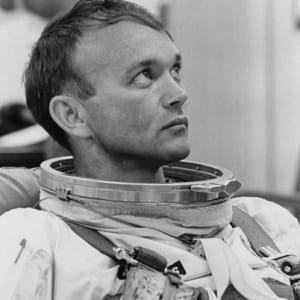An appreciation: Michael Collins
1930-2021
Two days before the first moon landing, William Safire wrote H.R. Haldeman a memo titled “IN THE EVENT OF MOON DISASTER.” A few hundred words long, it’s the statement Richard Nixon would have delivered if Buzz Aldrin and Neil Armstrong had been stranded at the Sea of Tranquility. It was to be delivered after the men shared their final communication with earth and before they ran out of oxygen. Safire wrote:
“Others will follow, and surely find their way home. Man’s search will not be denied. But these men were the first, and they will remain foremost in our hearts.”
Michael Collins, who died at 90 this week, isn’t mentioned. He’s the man who was in lunar orbit, waiting for Aldrin and Armstrong’s return. His mission wasn’t to walk on the moon. His mission was to find his way home, even if his crewmates didn’t.
I can imagine the sand that it would take to go into space. Bring the price down enough or give me a scholarship, and I’ll be one of those 60-somethings buying a ticket for a commercial space flight from Branson or Bezos or Musk someday. I’ve loved the space program — and the stories of the people who made it happen — for as long as I can remember.
But Michael Collins represented something more than simple courage. He was selected for that seat on Apollo 11 because he was judged one of the most talented, steely-eyed missile men of his generation. He wore a document on a lanyard with 18 contingency plans for saving Aldrin and Armstrong because NASA believed he had the skill to carry them out. Still, he could have failed. His craft could have failed. A valve that only had to open once on the lunar lander might have stuck closed. The math could have been bad. We’ve lost astronauts to less.
The burden of those lives literally hung around his neck. The prospect of abandoning them was real. Imagine carrying the knowledge that you would be the one to flip that toggle and return home without them. Imagine the self-control and emotional stamina of his particular mission. Imagine the bravery of Michael Collins.


